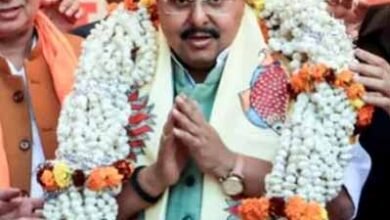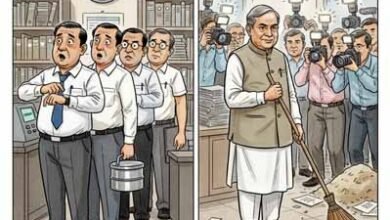
क्या वंशवाद ही वर्तमान राजनीती का मूल आधार है…?
भारतीय लोकतंत्र की आत्मा जनप्रतिनिधित्व में निहित है, जहाँ हर नागरिक को समान अवसर मिलना चाहिए। वहीँ, वंशवाद ही वर्तमान राजनीति का मूल आधार है, ऐसा कहना अतिशयोक्ति होगी, लेकिन यह कहना बिलकुल सही है कि वंशवाद भारतीय राजनीति की एक गहन और व्यापक समस्या है तथा यह लोकतंत्र के सिद्धांतों को कमज़ोर करता है.
वंशवाद या परिवारवाद उस राजनीतिक प्रणाली को दर्शाता है जहाँ राजनीतिक पद एक ही परिवार या वंश के सदस्यों द्वारा पीढ़ी दर पीढ़ी हस्तांतरित होते हैं, भले ही उनकी योग्यता कितनी भी हो. यह प्रवृत्ति भारत के राष्ट्रीय दलों से लेकर क्षेत्रीय दलों तक में देखी जा सकती है.
एक रिपोर्ट के अनुसार, लोकसभा में लगभग 31% सांसद ऐसे हैं जो राजनीतिक परिवारों से आते हैं. कांग्रेस में वंशवादी विधायकों की हिस्सेदारी 33.25% है, जबकि भाजपा में यह 18.62% है.
भारत के प्रमुख राष्ट्रीय दलों में भी वंशवाद की जड़ें गहरी हैं. कई बार देखा गया है कि प्रमुख नेताओं के बच्चे, रिश्तेदार या जीवनसाथी को राजनीतिक विरासत में आगे बढ़ने का मौका मिलता है.क्षेत्रीय दल अक्सर किसी एक परिवार के इर्द-गिर्द ही घूमते हैं, जहाँ पार्टी का नेतृत्व और महत्त्वपूर्ण पद प्रायः संस्थापक नेता के वंशजों को ही मिलते हैं. कुछ क्षेत्रीय दल तो ‘पारिवारिक दल’ का रूप ले चुके हैं.
वंशवाद के पनपने के पीछे कई कारण हैं – उनमें स्थापित राजनीतिक परिवारों के नाम को मतदाता पहले से जानते हैं. इससे नए उम्मीदवार को पहचान बनाने में लगने वाले प्रयास और समय की बचत होती है. वहीँ , राजनीतिक परिवारों के पास अक्सर चुनाव लड़ने के लिए पर्याप्त धन और वर्षों से स्थापित संगठनात्मक नेटवर्क होता है, जो चुनावी सफलता सुनिश्चित करने में सहायक होता है.वंशज अक्सर उन सीटों से चुनाव लड़ते हैं, जिन्हें उनके पूर्वजों ने दशकों से सुरक्षित रखा है, जिससे उनकी जीत की संभावना बढ़ जाती है.
राजनीतिक दलों को लगता है कि वंशज को टिकट देने से वे स्थापित वोट बैंक का लाभ उठा सकते हैं, इसलिए वे योग्यता की जगह रिश्तेदारी को प्राथमिकता देते हैं. पार्टी के अंदर आंतरिक लोकतंत्र का अभाव होने से नए और योग्य कार्यकर्ताओं को आगे आने का मौका कम मिलता है.
वंशवाद लोकतंत्र के लिए एक दीमक के समान है, जिसके कई नकारात्मक परिणाम सामने आते हैं – वंशवाद में योग्यता को दरकिनार कर विरासत को प्राथमिकता दी जाती है. इससे पार्टी के वफादार और मेहनती कार्यकर्ताओं का मनोबल गिरता है. वंशवादी राजनीति सत्ता को कुछ ही कुलीन परिवारों तक सीमित कर देती है, जिससे समाज के विभिन्न वर्गों का सही प्रतिनिधित्व कम हो जाता है.
वंशवादी नेता अक्सर अपने राजनीतिक आधार को सुरक्षित मानते हैं, जिससे उनकी जनता के प्रति जवाबदेही कम हो जाती है और वे ख़राब प्रदर्शन कर सकते हैं. वंशवादी व्यवस्था में पारदर्शिता कम होने की संभावना रहती है, जिससे भ्रष्टाचार को बढ़ावा मिल सकता है.
आम जनता में यह धारणा बनती है कि राजनीति “परिवारों का खेल” है, जिससे युवाओं का विश्वास टूटता है साथ ही राजनीतिक दलों के आंतरिक लोकतंत्रीकरण की आवश्यकता है. जनता को भी वंशवाद के विरुद्ध जागरूक होना होगा और योग्यता को प्राथमिकता देनी होगी.
वंशवाद आज की राजनीति में एक गहरी जड़ बन चुका है, लेकिन यह लोकतंत्र की नींव को कमजोर करता है. यदि राजनीति को वास्तव में जनसेवा का माध्यम बनाना है, तो वंशवाद की जकड़न से मुक्त होना अनिवार्य है. यह बदलाव केवल राजनीतिक दलों से नहीं, बल्कि समाज की सामूहिक चेतना से आएगा.
भारतीय राजनीति का मूल आधार संविधान, लोकतंत्र के सिद्धांत और जनता का जनादेश ही है, पर वंशवाद इन आदर्शों को कमज़ोर करता है. लोकतंत्र की मज़बूती के लिए राजनीतिक दलों को आंतरिक लोकतंत्र को बढ़ावा देना होगा और जनता को भी योग्य उम्मीदवार को वंश की विरासत से ऊपर रखकर चुनने के लिए अधिक सजग होना पड़ेगा.
संजय कुमार सिंह
(पोलिटिकल, सहायक एडिटर) ,
ज्ञानसागरटाइम्स.
========== ========= ===========
Is dynastic politics the fundamental basis of current politics…?

The soul of Indian democracy lies in representative government, where every citizen should have equal opportunities. While it would be an exaggeration to say that dynastic politics is the fundamental basis of current politics, it is absolutely true that dynasticism is a deep-seated and widespread problem in Indian politics and it weakens the principles of democracy.
Didacticism or nepotism refers to a political system where political positions are transferred from generation to generation within the same family or lineage, regardless of their qualifications. This trend can be seen in India’s national parties as well as regional parties.
According to a report, approximately 31% of MPs in the Lok Sabha come from political families. The share of dynastic legislators in the Congress is 33.25%, while in the BJP it is 18.62%.
Didacticism is deeply rooted even in India’s major national parties. It is often observed that the children, relatives, or spouses of prominent leaders get the opportunity to advance in the political arena through inheritance. Regional parties often revolve around a single family, where the party leadership and important positions are usually given to the descendants of the founding leader. Some regional parties have even taken the form of ‘family parties’.
There are several reasons behind the prevalence of didacticism – voters are already familiar with the names of established political families. This saves new candidates the effort and time required to establish their identity. Furthermore, political families often have sufficient funds and a long-established organizational network to contest elections, which helps ensure electoral success. Descendants often contest elections from constituencies that their ancestors have held for decades, increasing their chances of winning.
Political parties feel that by giving tickets to descendants, they can benefit from the established vote bank, so they prioritize kinship over merit. The lack of internal democracy within the party reduces the opportunities for new and qualified workers to rise through the ranks. Dynastic politics is like a termite to democracy, leading to several negative consequences – it prioritizes inheritance over merit, sidelining qualified individuals. This demoralizes loyal and hardworking party workers. Dynastic politics restricts power to a few elite families, reducing the proper representation of various sections of society.
Dynastic leaders often consider their political base secure, which reduces their accountability to the public and can lead to poor performance. Transparency is likely to be low in a dynastic system, which can foster corruption.
It creates a perception among the general public that politics is a “family game,” eroding the trust of young people and highlighting the need for internal democratization within political parties. The public must also be aware of the dangers of dynastic politics and prioritize merit.
Dynastic politics has become deeply entrenched in today’s politics, but it weakens the foundations of democracy. If politics is truly to be a means of public service, then it is essential to break free from the grip of didacticism. This change will come not only from political parties but also from the collective consciousness of society.
The fundamental basis of Indian politics is the Constitution, the principles of democracy, and the mandate of the people, but dynastic politics undermines these ideals. For the strengthening of democracy, political parties must promote internal democracy, and the public must also be more vigilant in choosing qualified candidates over those who inherit power through family connections.
Sanjay Kumar Singh
(Political, Assistant Editor),
Gyansagartimes.





